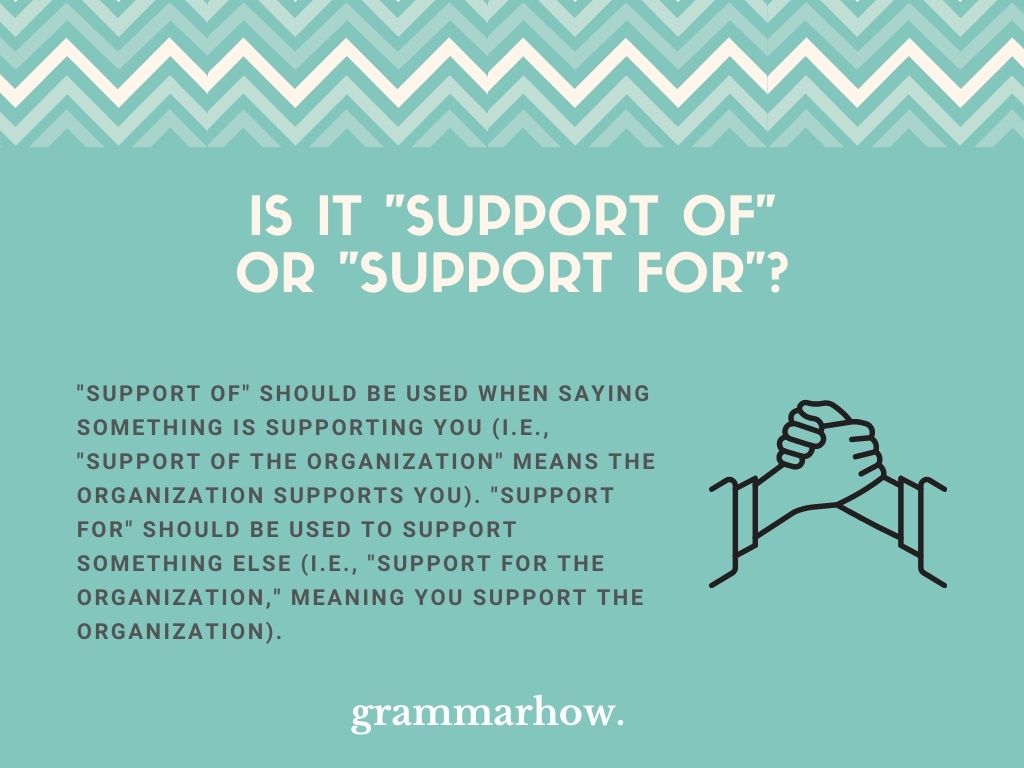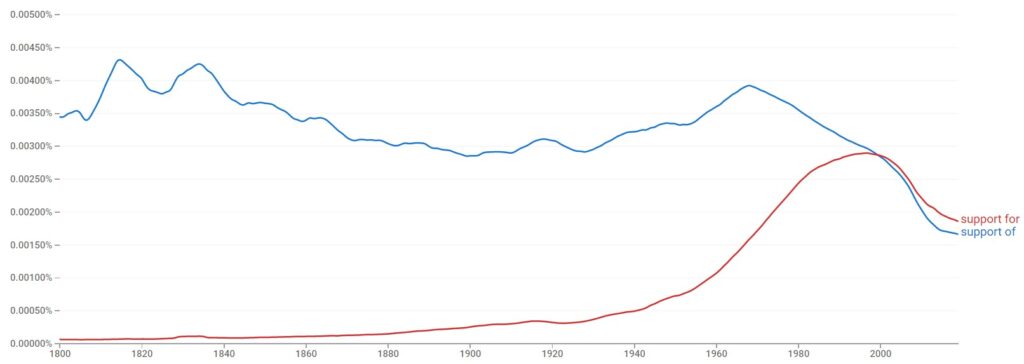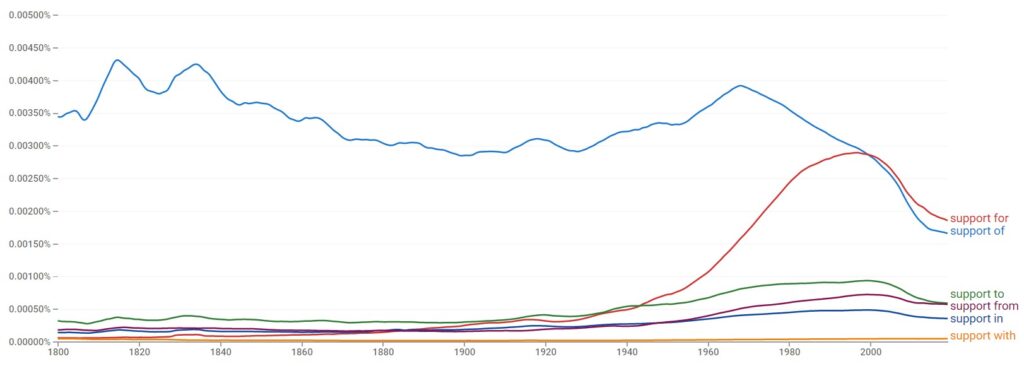Using the correct preposition after a word is important to make sure you know the right language rules associated with it. In this article, we’ll look at the differences between using “support of” and “support for” and what the different prepositions do to change them.
Is It “Support Of” Or “Support For”?
“Support of” should be used when saying something is supporting you (i.e., “support of the organization” means the organization supports you). “Support for” should be used to support something else (i.e., “support for the organization,” meaning you support the organization).

According to The Cambridge Dictionary, the definition of “support” is “to agree with and give encouragement to someone or something because you want him, her, or it to succeed.”
Is “Support Of” Or “Support For” Used The Most?
Generally, when we talk about “support,” we’re talking about showing support to someone else. That usually means that “support for” should be the more popular choice of the two. However, we have data that might contradict that claim.
According to this graph, “support for” is the more popular choice, but only by a small margin. “Support of” has been historically the more popular choice until around the year 2000, where “support for” started to increase.

We can also say that, according to Google, “support of” is mentioned 183,000 times on The New York Times website, while “support for” is mentioned 133,000 times.
These two pieces of information work against each other, but that just shows how similar these two prepositions are in usage. While the meanings are different, people are happy to use either one, provided it applies correctly to the context that they’re using.
In written English (on the graph), it’s more common to show your support for something. However, in news articles like you might find on The New York Times websites, it seems to be more common to talk about other things showing support towards something.
What Does Support Mean?
So, what does “support” mean exactly, and how can we use it?
“Support” means that we agree with somebody or something. We use it to show our encouragement and to indicate that we’re backing the person or thing to achieve whatever they set out to achieve.
There are plenty of ways that we can use “support” in a sentence, though its most notable cases are when we’re trying to encourage somebody or something to do something or achieve a common goal.
- We support you.
- I support you.
These are perhaps the most common cases to see “support” in a sentence. In this case, it’s a verb used to say that we are showing encouragement towards somebody.
You may also hear it used as a noun, which is the main reason we’re writing this article. In the case of it being a noun, it will be followed by a preposition like “of” or “for.” There are also other prepositions to use that we’ll go through later on.
Examples Of How To Use “Support Of” In A Sentence
We’ll now include some examples of how to use both phrases in a sentence. This will really help you to set them apart if you’re currently struggling to understand the major differences between them.
“Support of” is used when you want to show that something is encouraging something else rather than you directly giving it to somebody.
- The local organization is in support of environmental changes to fix the planet.
- The community is in support of equality.
- We rallied together as a community in support of rapid change.
- He’s been in support of people who speak their minds in government.
- The financial support of the government is what’s most important in these trying times.
- The support of the community has to be gained before you can go any further with your proceedings.
- The support of my family isn’t something that I’m used to receiving.
As you can see, “support of” refers to something giving us (or something else) the support. Whatever noun comes after “of” is the intended thing doing the supporting.
We might encourage other people to seek the support of other things if they’re looking to advance their ideas or achieve certain goals.
It’s also most common to see “in support of” written. This is used when we’re talking about something that is specifically promoting or encouraging a specific outlet or venue from another participant. “In support of” is a common phrase you’ll come across in English.
Examples Of How To Use “Support For” In A Sentence
Now let’s look at the differences when we use the phrase “support for.” This is much more common when we want to share our support with other people or things to encourage them to achieve something.
“Support for” is used when you want to encourage something specifically or when something else is helping out to support something.
- We need to show support for the local community if we’re going to work through this.
- Support for local businesses is incredibly important in these trying times.
- It’s important to show support for large companies during boycotts.
- If we don’t show the appropriate support for each other, we’ll all be lost.
- Support for your friends and family cannot be more desired.
- Support for the people you care about is important. Ask them how they’re doing and look after them.
- I’ve put together a fundraiser to help us show support for Sandra in her recovery.
In these cases, we’re talking about the things that we’re supporting. This time, the noun that comes after “for” is the object that we’re supporting in the sentence. It’s almost seen as an oppositional phrase to “support of.”
We don’t see the phrase “in support for” like we do “in support of” because the prepositions have a vastly different meaning that needs to be worked through. “In” only works when we’re using “for.”
Which Other Prepositions Can Be Used With “Support”?
“Of” and “for” aren’t the only prepositions you might come across. There are a few more out there that we think you should know about.
According to this graph, there are six total prepositions you can use. “Of” and “for” are by far the most popular. However, the others have their purpose.

Support To
“Support to” means that we’re showing our support towards a specific thing. It’s similar to using “support for” but much less common.
- I show my support to my colleagues when they need it.
- He is supporting to my needs.
Support From
“Support from” should be used when you’re receiving support from a specific thing. It’s similar to “support of” but much less common.
- I get support from the local football stadium.
- We have support from our boss to end this.
Support In
“Support in” should be used when you’re supporting someone “in” doing something. The word “in” is included to help them carry out a specific task. A pronoun must break up “support” and “in” to work.
- I support them in finishing the project.
- We support him in carrying out the task.
Support With
“Support with” should be used when you’re sharing the support. If you’re talking about other people that you’re supporting “with,” then use this phrase.
- I show my support with my parents at my side.
- We show support with each other.
Support – Synonyms
Let’s go over some alternatives to use that might help you understand the meaning better without the use of prepositions.
- Assist
If you assist somebody, it means you’re helping them through something or encouraging them to complete it.
- Help
“Help” is the most basic synonym of “support,” which means we’re helping somebody to achieve something.
What Is The Meaning Of “In Support Of”?
“In support of” is used when we want to say that we’re supporting something. We’ve covered it in some examples above, using the phrase to show that we’re in support of a certain thing.
Is It Ever Correct To Use “Support Towards”?
“Towards” is not a preposition that we commonly use after words. “Support towards” is not a suitable phrase for this reason, and the same meaning can be conveyed with either “support to” or the more popular “support for.”
What Is The Difference Between “Support” And “Supporting”?
“Support” is a noun form we can use to show that we’re encouraging somebody or something to complete something. “Supporting” is the present participle verb form we use when we want to say that we are doing the action of supporting someone or something.
- I am in support of changing the local government.
- I am supporting the things that are important to me.
We need an auxiliary verb like “am” or “are” to accompany “supporting” if we’re using it in this sense. It becomes the present perfect tense when we do so.
Is It “Support” Or “Supports”?
“Support” should be used when you’re using the first-person singular pronoun (I) or the plural pronouns (you, we, they). “Supports” should be used when you’re using the third-person singular pronouns (he, she, it).
- I support him.
- He supports me.
- We support her.
- She supports us.
